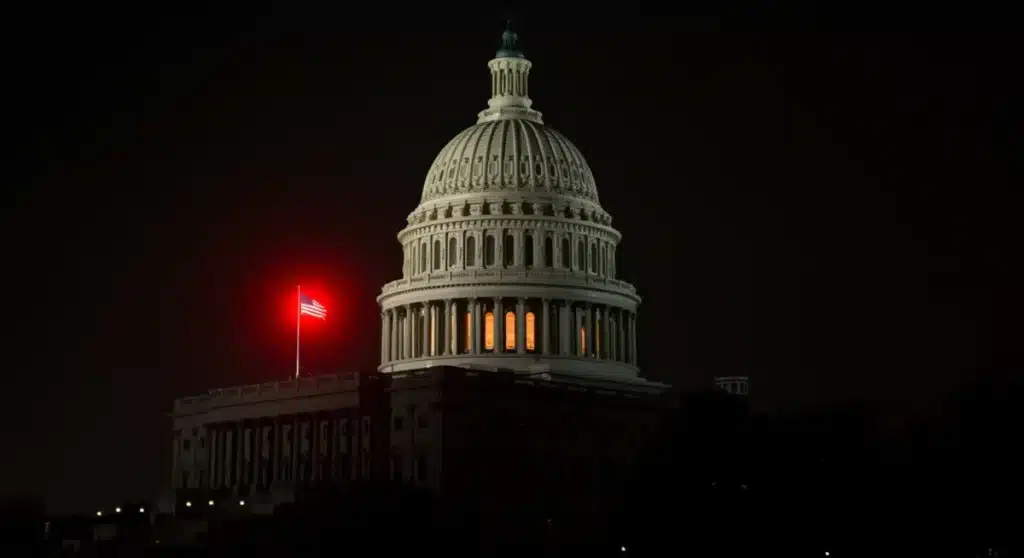Government Shutdown: National Security Consequences

A government shutdown significantly jeopardizes national security by disrupting critical intelligence gathering, weakening military readiness, and compromising cybersecurity defenses, leading to profound and lasting operational challenges.
When the machinery of government grinds to a halt, the ripple effects can be profound, particularly concerning the question of what are the potential consequences of the current government shutdown on national security. This isn’t just about unpaid federal workers or closed national parks; it’s about the unseen but vital functions that protect the country from myriad threats. Understanding these complex implications is crucial for every citizen. Join us as we delve into the critical vulnerabilities exposed and exacerbated by such political impasses.
Impact on Intelligence Operations and Data Collection
A government shutdown immediately hampers the nation’s intelligence apparatus, a cornerstone of national security. The intricate web of data collection, analysis, and dissemination relies on a continuous flow of resources and personnel. Disruptions here create dangerous blind spots, potentially leaving the country vulnerable to emerging threats.
Intelligence agencies, including the CIA, NSA, and FBI, operate 24/7 to monitor global threats, counter-terrorism efforts, and cyber warfare. During a shutdown, a significant portion of their workforce, deemed non-essential, is furloughed. This forced reduction in personnel means a drastic cut in the capacity to collect, process, and analyze critical intelligence. Essential personnel may remain, but their effectiveness is often compromised by reduced support staff and strained resources. The continuity of operations is severely tested, creating gaps that adversaries can exploit.
Compromised Surveillance and Analysis
Surveillance operations, both domestic and international, require constant staffing and technical support. Without full teams, the ability to track suspicious activities, intercept communications, and maintain situational awareness is diminished. This can lead to delays in identifying threats or even outright failure to detect them.
- Reduced human intelligence (HUMINT) gathering due to travel restrictions and furloughs.
- Interruption of signal intelligence (SIGINT) processing, leading to unprocessed data backlogs.
- Decreased capacity for open-source intelligence (OSINT) analysis, missing crucial public domain information.
- Stalled development and maintenance of advanced surveillance technologies.
The long-term effects are equally concerning. Even after a shutdown ends, it takes time to restore full operational capacity. Backlogs of unanalyzed data accumulate, and the momentum built in ongoing investigations can be lost. This creates a strategic disadvantage, as adversaries do not pause their activities during internal political disputes.
In essence, the intelligence community functions as the nation’s eyes and ears. A shutdown blurs its vision and dulls its hearing, making the nation less informed and thus less secure. The lag in intelligence gathering and analysis can have catastrophic consequences, as timely information is paramount in preventing attacks and responding to crises.
Weakening Military Readiness and Defense Capabilities
The military, often seen as the ultimate guarantor of national security, is paradoxically among the most directly affected by a government shutdown. While troops deployed in active combat zones typically remain on duty, the broader infrastructure supporting their operations and the readiness of the entire force suffer significant blows.
Funding freezes halt critical training exercises, delay equipment maintenance, and impact the pay of many service members and civilian defense employees. This erosion of resources and morale can have a devastating effect on overall military readiness, making it harder for the United States to respond effectively to global challenges or protect its interests.
Disruption of Training and Maintenance
Routine training, vital for maintaining combat proficiency and interoperability, is frequently suspended during a shutdown. This includes flight hours for pilots, ship maintenance, and ground force drills. Such interruptions degrade skills and can make equipment less reliable. Furthermore, the delay in procurement and upgrades for military hardware can leave forces with outdated or insufficient technology.
- Cancellation of essential training exercises, impacting unit cohesion and skill retention.
- Postponement of critical equipment maintenance, leading to potential failures and safety hazards.
- Delays in research and development for future defense technologies.
- Reduction in operational tempo for non-essential missions, affecting global presence.
The uncertainty surrounding paychecks for active-duty personnel and civilian defense workers also takes a heavy toll on morale. While essential personnel continue to work, the stress of potential financial hardship can distract from their mission-critical duties. This human element, often overlooked, is a crucial component of military effectiveness. A distracted or demoralized force is a less effective force, regardless of its technological superiority.
Ultimately, a government shutdown weakens the military’s ability to deter aggression and project power. It creates an impression of instability and vulnerability, which adversaries may perceive as an opportunity. Restoring full readiness after a prolonged shutdown is not an immediate process; it requires significant time and effort, further extending the period of potential weakness.
Compromised Cybersecurity Defenses and Infrastructure
In an increasingly digital world, national security is inextricably linked to cybersecurity. A government shutdown poses a severe threat to these defenses, leaving critical infrastructure and sensitive data vulnerable to cyberattacks. The very systems designed to protect the nation become exposed when the personnel and resources dedicated to their upkeep are sidelined.
Cybersecurity agencies and departments, such as the Cybersecurity and Infrastructure Security Agency (CISA) and components of the Department of Defense, rely on constant vigilance and proactive measures. During a shutdown, staffing levels for these crucial functions are often drastically reduced. This means fewer eyes on the network, slower response times to incidents, and a diminished capacity to implement preventative measures.
Increased Vulnerability to Cyberattacks
The reduction in cybersecurity personnel leaves federal networks and critical infrastructure more susceptible to exploitation. Furloughed employees mean fewer analysts monitoring for threats, fewer engineers patching vulnerabilities, and fewer incident responders ready to act. This creates an inviting target for state-sponsored hackers, terrorist groups, and cybercriminals.
- Delayed patching of known software vulnerabilities across government systems.
- Reduced monitoring of network traffic for malicious activity.
- Slower response times to detected cyber incidents, allowing attacks to propagate further.
- Stalled development of new cybersecurity tools and strategies.
Beyond the immediate operational impact, a shutdown can also disrupt long-term cybersecurity initiatives. Research and development projects aimed at enhancing defensive capabilities may be paused, and collaboration with private sector partners can suffer. The digital landscape evolves rapidly, and any period of stagnation can put the nation significantly behind its adversaries.
The consequences of a successful cyberattack can be far-reaching, from the exfiltration of classified information to the disruption of essential services like power grids or financial systems. A government shutdown effectively rolls out a welcome mat for those seeking to exploit digital weaknesses, making the nation’s digital infrastructure less resilient and more prone to severe breaches.
Erosion of International Trust and Alliances
National security is not solely an internal affair; it heavily relies on robust international relationships and alliances. A government shutdown can severely damage the United States’ standing on the global stage, eroding trust among allies and potentially emboldening adversaries. The perception of instability and unreliability can have lasting geopolitical consequences.
When the U.S. government is perceived as dysfunctional or unable to manage its internal affairs, it sends a message of weakness to both friends and foes. Diplomatic engagements may be postponed or canceled, foreign aid programs can be disrupted, and the ability to negotiate critical treaties or agreements is undermined. This creates a vacuum that other global powers may be quick to fill.
Impact on Diplomatic Engagements and Partnerships
Diplomatic staff, like many other federal employees, can be furloughed during a shutdown. This limits the capacity of embassies and consulates to conduct routine diplomatic activities, respond to crises, or maintain vital communications with host nations. The absence of key personnel can lead to misunderstandings, delays in critical decisions, and a general cooling of relations.
- Cancellation or postponement of high-level diplomatic meetings and negotiations.
- Disruption of intelligence sharing with key allies, creating operational gaps.
- Reduced capacity for consular services, affecting citizens abroad and international travel.
- Perception of U.S. unreliability as a global partner.

Furthermore, the financial instability associated with a shutdown can raise questions about the U.S.’s commitment to international agreements and its ability to fund joint security initiatives. Allies may begin to seek alternative partners or question the reliability of U.S. support, leading to a fragmentation of alliances that have been carefully built over decades.
In the long term, a weakened international standing can make it harder for the U.S. to rally support for its foreign policy objectives, counter global threats, or exert its influence in critical regions. The erosion of trust is a slow but damaging process, and restoring it requires consistent and reliable engagement, which is precisely what a shutdown undermines.
Disruption of Critical Infrastructure Protection
Beyond government agencies, national security also relies on the robust protection of critical infrastructure, encompassing everything from energy grids and transportation networks to water systems and public health services. A government shutdown can severely compromise these protective measures, leaving essential services vulnerable to attack, malfunction, or natural disaster.
Agencies responsible for infrastructure protection, such as the Department of Homeland Security (DHS) and various regulatory bodies, play a crucial role in coordinating efforts between federal, state, local, and private sector entities. During a shutdown, their ability to perform these functions is significantly curtailed, creating potential points of failure across vital systems.
Reduced Oversight and Incident Response
Many federal employees involved in inspecting, monitoring, and responding to threats against critical infrastructure are deemed non-essential and furloughed. This reduction in oversight can lead to missed vulnerabilities, delayed responses to incidents, and a general weakening of the safety net designed to protect these vital assets.
- Fewer inspections of nuclear power plants, chemical facilities, and hazardous material transport.
- Reduced coordination with state and local emergency management agencies.
- Delays in processing permits and certifications for critical infrastructure projects.
- Diminished capacity for threat intelligence sharing with private sector operators.
The interconnected nature of modern infrastructure means that a failure in one area can quickly cascade through others. A cybersecurity breach in an energy grid, for example, could disrupt transportation and communication systems. During a shutdown, the ability to quickly identify and mitigate such threats is severely hampered, increasing the risk of widespread disruption.
Moreover, long-term planning and investment in infrastructure resilience can be put on hold. Projects aimed at upgrading aging systems or enhancing their security against evolving threats may be delayed, leaving the nation with less robust defenses. Protecting critical infrastructure requires continuous effort, and any pause in that effort creates opportunities for those who wish to cause harm or exploit weaknesses.
Long-Term Economic and Social Repercussions
While the immediate focus of a government shutdown’s effect on national security often centers on military and intelligence operations, the long-term economic and social repercussions also contribute to a less secure nation. Economic instability and social unrest can create vulnerabilities that adversaries can exploit, both domestically and internationally.
A shutdown can lead to significant economic losses, not just from unpaid federal worker salaries but also from disrupted government contracts, stalled business permits, and reduced consumer confidence. This economic strain can weaken the nation’s overall capacity to fund its defense and security initiatives in the future, creating a cycle of vulnerability.
Impact on Public Services and Social Stability
Beyond direct economic costs, a shutdown affects a wide array of public services that, while not explicitly national security functions, contribute to the overall stability and resilience of the nation. Disruptions to food safety inspections, environmental protections, and scientific research can have cascading effects that undermine public trust and well-being.
- Delayed processing of benefits for veterans and other vulnerable populations.
- Interruption of scientific research crucial for technological advancement and national competitiveness.
- Reduced oversight of financial markets, potentially increasing risks of fraud or instability.
- Erosion of public trust in government’s ability to provide essential services.
Social unrest, fueled by economic hardship and a perceived failure of government, can also present national security challenges. Disinformation campaigns and extremist narratives can gain traction in such environments, potentially leading to domestic instability. A nation preoccupied with internal divisions is less capable of addressing external threats.
In essence, a strong and stable society forms the bedrock of national security. When a government shutdown introduces economic uncertainty and social disruption, it chips away at this foundation. The cumulative effect of these long-term repercussions can diminish the nation’s overall strength and resilience, making it a less formidable and more vulnerable entity on the global stage.
| Key Impact Area | Brief Description of Consequence |
|---|---|
| Intelligence Operations | Disrupts data collection, analysis, and threat monitoring, creating dangerous blind spots. |
| Military Readiness | Halts training, delays maintenance, and impacts morale, weakening defense capabilities. |
| Cybersecurity | Increases vulnerability to cyberattacks due to reduced monitoring and incident response. |
| International Standing | Erodes trust among allies and emboldens adversaries, diminishing global influence. |
Frequently Asked Questions About Government Shutdowns and National Security
During a shutdown, many military personnel, particularly civilian defense employees, may be furloughed without pay. Active-duty service members might continue working but face delayed or uncertain paychecks, leading to significant financial stress. This directly impacts morale and readiness, even for those in critical roles, as their focus shifts to personal financial stability.
No, intelligence agencies are not completely halted. Essential personnel continue to work, especially those involved in immediate threat detection and counter-terrorism. However, a significant portion of their workforce, including analysts, support staff, and researchers, is furloughed. This drastically reduces overall capacity, creating intelligence gaps and slowing down critical operations and analysis.
Yes, a shutdown increases the risk of cyberattacks. With fewer cybersecurity personnel on duty, there’s reduced monitoring of government networks for malicious activity, slower response times to incidents, and delays in patching vulnerabilities. This creates an inviting environment for cyber adversaries to exploit weaknesses and compromise sensitive systems or data.
Government shutdowns project an image of instability and unreliability. They can lead to the cancellation of diplomatic meetings, disrupt intelligence sharing with allies, and raise doubts about the U.S.’s commitment to international agreements. This erosion of trust can weaken alliances and embolden adversaries, diminishing the nation’s global influence and security posture.
Repeated shutdowns lead to cumulative damage. They can cause a brain drain of talented federal employees, permanently disrupt critical programs, and foster a perception of consistent instability. Over time, this weakens institutional knowledge, degrades operational capabilities, and makes the nation less resilient and less effective in addressing both domestic and international security challenges.
Conclusion
The exploration of what are the potential consequences of the current government shutdown on national security reveals a complex and deeply troubling landscape. From immediate disruptions in intelligence gathering and military readiness to the insidious erosion of cybersecurity defenses and international trust, the ripple effects are far-reaching and profound. These political impasses do not merely pause government functions; they actively compromise the intricate systems designed to protect the nation. The long-term economic and social repercussions further destabilize the foundation upon which robust national security is built. Ultimately, a government shutdown is not a benign political maneuver; it is a direct threat to the safety and stability of the United States, demanding a serious reconsideration of its frequency and impact.





